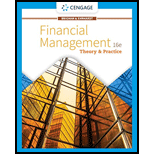
a.
To explain:
Interest tax shield and vale of tax shield
a.
Explanation of Solution
Interest tax shield is availing tax deduction in tax amount for individual and for corporate as well. It includes all reduction and deduction mentioned in tax laws.
Value of tax shield is the amount of gain by the tax shield in future and can be calculated in present amount known as the value interest tax shield.
b.
To explain:
Adjusted
b.
Explanation of Solution
Adjusted present value helps to know the net value of the company. It includes unlevered cost of firm and discounted tax amount.
c.
To explain:
Compressed adjusted present value (CAPV) method
c.
Explanation of Solution
Adjusted present value helps to know the net value of the company. It includes unlevered cost of firm and discounted tax amount. It is called compressed because free cash flows and tax shields are discounted at the same rate.
d.
To explain:
Free cash flows to equity model
d.
Explanation of Solution
Want to see more full solutions like this?
Chapter 21 Solutions
Financial Management: Theory & Practice
- please don't use ai and if you cant understand given values please don't answer question otherwise unhelpful will be given.arrow_forwardfinance subjectarrow_forwardCould you help explain, what is the complete salary survey analysis, and ensuring the data is relevant and up-to-date? What is the job evaluation and compensation plan? How to ensure the final report is comprehensive, clearly structured, and aligned with the company vision?arrow_forward
- The maturity value of an $35,000 non-interest-bearing, simple discount 4%, 120-day note is:arrow_forwardCarl Sonntag wanted to compare what proceeds he would receive with a simple interest note versus a simple discount note. Both had the same terms: $18,905 at 10% for 4 years. Use ordinary interest as needed. Calculate the simple interest note proceeds. Calculate the simple discount note proceeds.arrow_forwardWhat you're solving for Solving for maturity value, discount period, bank discount, and proceeds of a note. What's given in the problem Face value: $55300 Rate of interest: 10% Length of note: 95 days Date of note: August 23rd Date note discounted: September 18th Bank discount rate:9 percentarrow_forward
 Intermediate Financial Management (MindTap Course...FinanceISBN:9781337395083Author:Eugene F. Brigham, Phillip R. DavesPublisher:Cengage Learning
Intermediate Financial Management (MindTap Course...FinanceISBN:9781337395083Author:Eugene F. Brigham, Phillip R. DavesPublisher:Cengage Learning
 College Accounting, Chapters 1-27AccountingISBN:9781337794756Author:HEINTZ, James A.Publisher:Cengage Learning,Principles of Accounting Volume 2AccountingISBN:9781947172609Author:OpenStaxPublisher:OpenStax College
College Accounting, Chapters 1-27AccountingISBN:9781337794756Author:HEINTZ, James A.Publisher:Cengage Learning,Principles of Accounting Volume 2AccountingISBN:9781947172609Author:OpenStaxPublisher:OpenStax College





